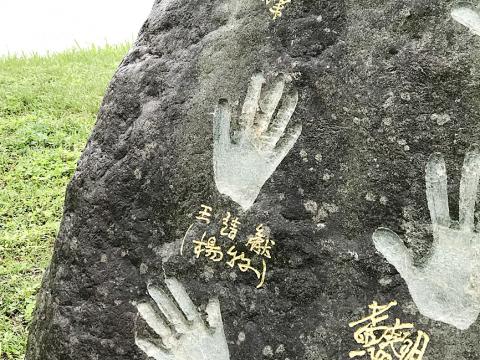Renowned Taiwanese poet, essayist and critic Yang Mu (楊牧) died on Friday in a Taipei hospital at the age of 79, said Shiu Wen-wei (須文蔚), a professor of Sinophone literature at National Dong Hwa University.
Yang, the pen name of Wang Ching-hsien (王靖獻), had suffered respiratory and heart ailments in the past few years, and was admitted to Cathay General Hospital’s intensive care unit last week after his health deteriorated, said Shiu, a longtime friend of Yang’s.
He had been in a coma since being admitted and never regained consciousness, Shiu said, adding: “He passed away peacefully.”

Photo: CNA
There will be no public funeral, but Yang’s family would arrange a memorial service with readings and music after the COVID-19 outbreak in Taiwan ends, he said.
Yang Mu was born on Sept. 6, 1940, in Hualien County. After graduating from Tunghai University’s foreign languages and literature department, he went to the US for graduate studies. He earned a master of fine arts in creative writing from the University of Iowa in 1966, and a doctorate in comparative literature in 1971 from the University of California, Berkeley.
After teaching in the US for 30 years, Yang returned home in 1995.
He helped found Dong Hwa’s College of Humanities and Social Sciences and created a resident writer program for the university that was unprecedented in Taiwan at the time.
Yang wrote more than two dozen collections of poetry and prose and is considered one of Taiwan’s most iconic literary figures, inspiring generations of Chinese-language poets.
Nils Goran David Malmqvist, a former member of the Swedish Academy’s selection committee for the Nobel Prize in Literature, reportedly thought that Yang should have been contender for the prize.
Yang was awarded the National Culture and Arts Award in 2000 and the Hua Zong Literature Award in Malaysia in 2007. In 2013, he was awarded the Newman Prize for Chinese Literature, the first poet and the first Taiwanese to do so, and in 2016, the Cikada Prize from the Swedish Institute.
Hsu Yu-fang (許又方), who organizes the Yang Mu Literature Lecture at Dong Hwa, once said that the poet left a “clear and unique path of creation that embraces innovation and changes” after 60 years of writing.
Yang donated his personal library to Dong Hwa to create the Yang Mu Study.

A magnitude 4.9 earthquake struck off Tainan at 11:47am today, the Central Weather Administration (CWA) said. The hypocenter was 32.3km northeast of Tainan City Hall at a depth of 7.3km, CWA data showed. The intensity of the quake, which gauges the actual effect of a seismic event, measured 4 in Tainan and Chiayi County on Taiwan's seven-tier intensity scale, the data showed. The quake had an intensity of 3 in Chiayi City and County, and Yunlin County, while it was measured as 2 in Kaohsiung, Nantou County, Changhua County, Taitung County and offshore Penghu County, the data showed. There were no immediate reports of

Weather conditions across Taiwan are expected to remain stable today, but cloudy to rainy skies are expected from tomorrow onward due to increasing moisture in the atmosphere, according to the Central Weather Administration (CWA). Daytime highs today are expected to hit 25-27°C in western Taiwan and 22-24°C in the eastern counties of Yilan, Hualien, and Taitung, data on the CWA website indicated. After sunset, temperatures could drop to 16-17°C in most parts of Taiwan. For tomorrow, precipitation is likely in northern Taiwan as a cloud system moves in from China. Daytime temperatures are expected to hover around 25°C, the CWA said. Starting Monday, areas

Taiwan has recorded its first fatal case of Coxsackie B5 enterovirus in 10 years after a one-year-old boy from southern Taiwan died from complications early last month, the Centers for Disease Control (CDC) said yesterday. CDC spokesman Lo Yi-chun (羅一鈞) told a news conference that the child initially developed a fever and respiratory symptoms before experiencing seizures and loss of consciousness. The boy was diagnosed with acute encephalitis and admitted to intensive care, but his condition deteriorated rapidly, and he passed away on the sixth day of illness, Lo said. This also marks Taiwan’s third enterovirus-related death this year and the first severe

A Taiwanese software developer has created a generative artificial intelligence (AI) model to help people use AI without exposing sensitive data, project head Huang Chung-hsiao (黃崇校) said yesterday. Huang, a 55-year-old coder leading a US-based team, said that concerns over data privacy and security in popular generative AIs such as ChatGPT and DeepSeek motivated him to develop a personal AI assistant named “Mei.” One of the biggest security flaws with cloud-based algorithms is that users are required to hand over personal information to access the service, giving developers the opportunity to mine user data, he said. For this reason, many government agencies and